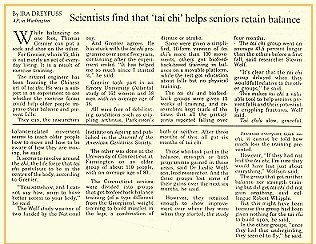
While
balancing on one foot, Thomas Grenier can put a sock and
shoe on the other. For Grenier, who is 75, this is not merely
an act of everyday living. It is a result of exercise training.
The retired engineer has been learning the Chinese art of
tai chi. He was a subject in an experiment to see whether
the exercise forms could help older people improve their
balance and prevent falls. They can, the researchers say.
And Grenier agrees. He has stuck with the tai chi program
over some five years, continuing after the experiment ended.
“It has helped me so much since I started it,”
he said.
Grenier
took part in an Emory University (Atlanta) study of 162
women and 38 men with an average age of 76. All were free
of debilitating conditions such as crippling arthritis,
Parkinson’s disease or stroke. Some were given a simplified,
10-form version of tai chi’s more than 100 movements,
others got biofeedback-based training in balance on a movable
platform, while the rest got education about falls but no
physical training.
The
tai chi and biofeedback groups were given 15 weeks of training,
and researchers kept track of the times that all the participants
reported falling over four months. The tai chi group went
on average 47.5 percent longer than the others before a
first fall, said researcher Steven Wolf. “It’s
clear that the tai chi group delayed when they would fall
relative to the other groups,” he said. This makes
tai chi a valuable tool to help seniors prevent falls and
their potentially crippling fractures. Wolf said.
Tai
chi’s slow, graceful, balance-related movement seems
to teach older people how to move and how to be aware of
how they are moving, he said. It seems to revolve around
the chi, the life force that tai chi postulates to be in
the centre of the body, according to Grenier. “You
somehow, and I cannot say how, seem to have better access
to your body,” he said.
The
Wolf study was one of two funded by the National Institute
on Ageing and published in the Journal of the American Geriatrics
Society. The other was done at the University of Connecticut
at Farmington on an older group of about 110 people, with
an average age of 80. The Connecticut seniors were divided
into groups that got biofeedback balance training (of a
type different from the Georgians), weight training to build
muscles in the legs, a combination of both or neither. After
three months of this, all got six months of tai chi.
Those
who took part in the balance, strength or both programs
gained in those areas, said Dr Leslie Wolfson, lead researcher.
And the three groups lost some of their gains over the next
six months, he said. However, they retained enough to show
improvement over where they were when they started, the
study. Because everyone took tai chi, it cannot be told
how much loss the training prevented. However, “If
they had not had the tai chi, I’m sure they would
have lost just about everything,” Wolfson said.
The
group that got neither balance nor strength training but
did get tai chi did not gain anything, said colleague Robert
Whipple. But this might have been because this group had
been given nothing for the tai chi to build upon, he said.
In the other groups, “once they had that undergirding,
they seemed to fly,” he said.
 Raising Center - A Model Development In Cambodia
Raising Center - A Model Development In Cambodia
 Feeling Low? Blame The Floor Polish!
Feeling Low? Blame The Floor Polish!
 Scientist Find That "Tai Chi" Helps Seniors Retain Balance
Scientist Find That "Tai Chi" Helps Seniors Retain Balance
 UN says AIDS cases rose by 25% in 1995
UN says AIDS cases rose by 25% in 1995  Oral Sex May Be An AIDS Risk
Oral Sex May Be An AIDS Risk
 Ultimate Act Of Love - Elephant rams truck - to save
5-year-old boy's life!
Ultimate Act Of Love - Elephant rams truck - to save
5-year-old boy's life!
 Vegetarianism - The Road To Health
Vegetarianism - The Road To Health
 HIV Is Transmittable Via Mouth, Study Says
HIV Is Transmittable Via Mouth, Study Says
 ‘Mad Cow’ Threat to Humans
‘Mad Cow’ Threat to Humans  Take Control Of Your Allergies
Take Control Of Your Allergies